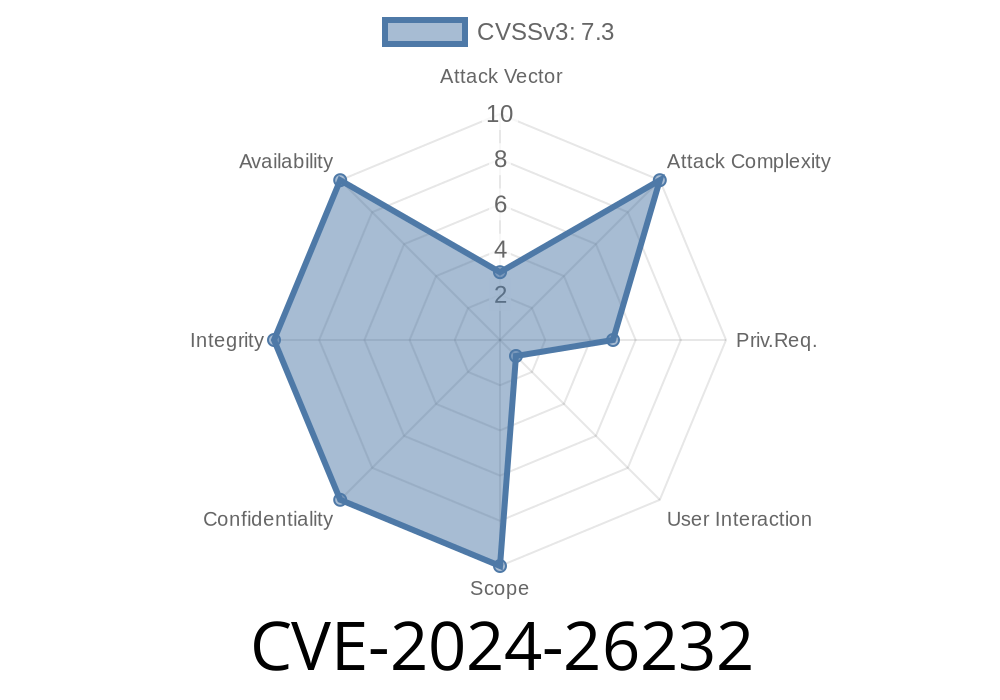Published: June 2024
Author: [Your Name Here]
1. What is CVE-2024-26232?
On Patch Tuesday, Microsoft disclosed a critical remote code execution (RCE) bug in *Microsoft Message Queuing* (MSMQ), tracked as CVE-2024-26232. MSMQ is an old Windows component that helps apps talk to each other by sending messages, even if networks or systems are down temporarily. A lot of banks, legacy apps, and enterprise tools still use it.
This new flaw means someone on your network, or with special access, could send a malicious MSMQ message and *run code on your computer*. It’s as bad as it sounds—attackers might deploy ransomware, steal data, or take over business-critical infrastructure.
2. How Dangerous Is It?
Microsoft gave it a CVSS score of 9.8/10, which means it’s *easy to exploit* and *really dangerous*.
Why?
Works on default settings (if MSMQ is enabled)
- Affects Windows 10/11, Windows Server 2022/2019/2016 and others
3. How Attackers Exploit It
Attackers can send a specially crafted NetBIOS packet or HTTP request to the MSMQ service (mqsvc.exe). If your machine has port 1801 (or relevant ports) open and MSMQ is running, the attacker just needs network access. Once the malicious message is processed, their code executes within the context of the MSMQ service—usually with full system privileges.
Network Layout Example
Attacker System ====>(TCP port 1801)====> Vulnerable Windows Server (MSMQ Enabled)
4. Code Snippet: Real Attack Example
Let’s see how a pen-tester could check if a server is vulnerable.
Step 1: Detect MSMQ
# See if MSMQ is running
Get-Service -Name MSMQ
# Check MSMQ TCP ports (usually 1801)
netstat -ano | findstr 1801
Here's a simple Python snippet to send a malformed MSMQ packet (for *educational use only!*)
import socket
target_ip = '192.168.1.100'
target_port = 1801
# MSMQ expects binary packets. Here, send bad data.
payload = b'\x00\x01\x02\x03\x04FAKEVULNEXPLOITDATA\xFF\xEE'
s = socket.socket(socket.AF_INET, socket.SOCK_STREAM)
s.connect((target_ip, target_port))
s.send(payload)
print("Payload sent! Check for crash or code execution.")
s.close()
*A full weaponized exploit would use specific binary formatting to trigger the vulnerability and payload execution. That detail is not public as of writing for security reasons.*
Disable-WindowsOptionalFeature -Online -FeatureName MSMQ-Server
`
- Restrict Port Access
Block TCP port 1801 from outside traffic using Windows Firewall or network ACLs.
- Monitor for Suspicious Activity
Watch event logs for unusual MSMQ activity or service crashes.
---
## 6. Original References
- Microsoft Security Response Center – CVE-2024-26232
- NVD – CVE-2024-26232
- Microsoft Message Queuing (MSMQ) documentation
---
## 7. Summary
CVE-2024-26232 is a *critical* remote code execution vulnerability in Microsoft Message Queuing. If you’re running any version of Windows with MSMQ enabled, you could be at risk of a devastating cyberattack with little to no warning.
Action Items:
1. Patch now
2. Remove or restrict MSMQ
3. Monitor for unusual traffic on port 1801
If you want to keep your systems secure, check your inventory for MSMQ and get those updates applied ASAP!
---
*Stay safe out there. For more in-depth security breakdowns, follow my blog or reach out on Twitter!*
Timeline
Published on: 04/09/2024 17:15:43 UTC
Last modified on: 04/10/2024 13:24:00 UTC
